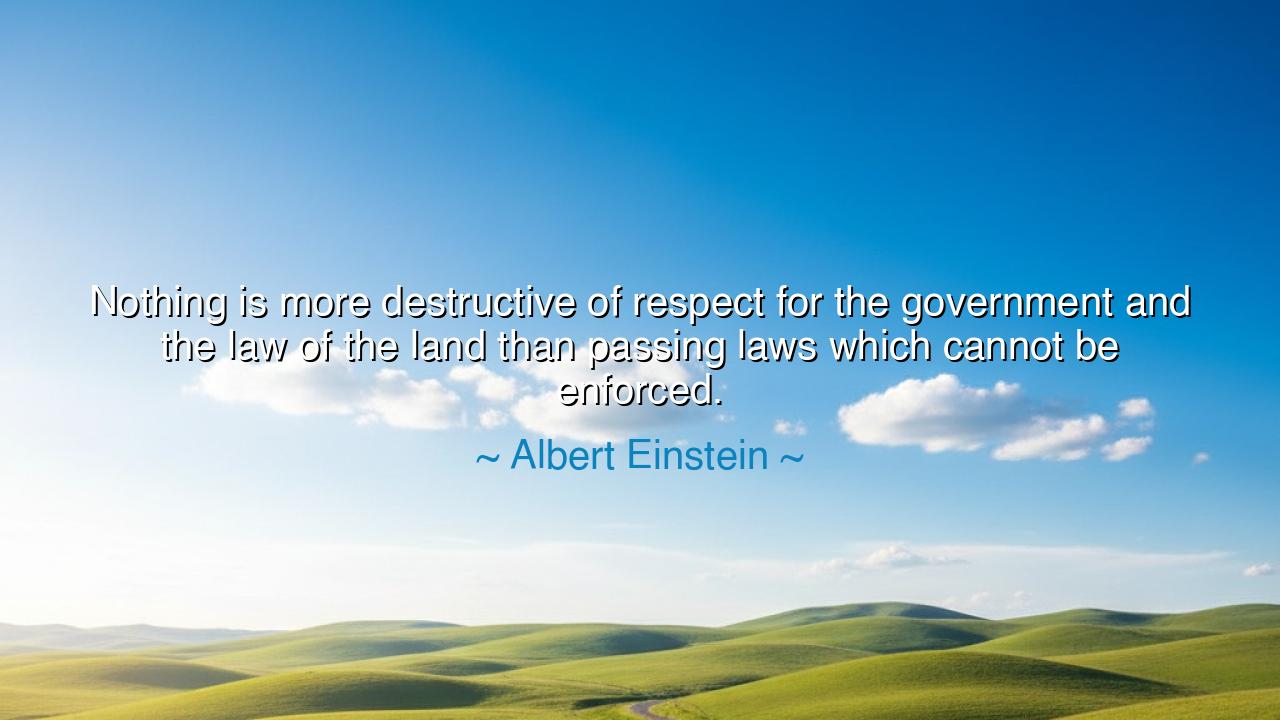
Nothing is more destructive of respect for the government and the
Nothing is more destructive of respect for the government and the law of the land than passing laws which cannot be enforced.






"Nothing is more destructive of respect for the government and the law of the land than passing laws which cannot be enforced." — Albert Einstein
Hear these words, O seekers of wisdom, and let them fall upon your mind as rain upon the dry earth. Albert Einstein, whose genius illuminated not only the mysteries of the universe but the moral fabric of humanity, spoke these words as a warning to rulers and the ruled alike. When he declared, “Nothing is more destructive of respect for the government and the law of the land than passing laws which cannot be enforced,” he did not speak as a politician or jurist, but as a philosopher of conscience. For he understood that the greatness of a nation lies not in the number of its laws, but in the justice and truth that give those laws life. A law unenforceable is a lie in ink — a shadow masquerading as order, breeding hypocrisy instead of harmony.
The meaning of this saying reaches to the heart of what sustains civilization. Einstein warns that when governments pass laws beyond reason or reach, they do not strengthen authority, but weaken it. For every law that cannot be obeyed or fairly enforced becomes a monument to folly. It teaches the people that justice is not sacred but selective, that law is not the guardian of virtue but the tool of vanity. When such laws multiply, the people’s respect for government decays, and the covenant between ruler and citizen is broken. For a society that ceases to believe in the fairness of its laws will soon cease to believe in the necessity of law itself.
The origin of Einstein’s reflection was not abstract, but born of the turmoil of his own age. He lived through times when governments sought to command not only actions, but thoughts — when totalitarian regimes in Germany and elsewhere turned law into chains for the human spirit. Yet he also observed the failure of democracies when they passed laws without foresight or moral grounding. One such example was Prohibition in the United States. The government, in an attempt to cleanse society, outlawed the making and sale of alcohol. But the law was unenforceable, for it fought not crime but human nature. Rather than uplifting society, it drove decent men into defiance, bred corruption, and gave rise to organized crime. In seeking to impose virtue, the government destroyed respect for the law itself — exactly as Einstein foresaw.
The story of Prohibition is a parable for all ages. When people saw their neighbors, their fathers, their local merchants turned into “criminals” by decree, their faith in justice faltered. The law of the land became a jest, its enforcers ridiculed, its purpose corrupted. Respect for authority, once broken, cannot be easily restored. For trust, once lost, does not return with mere punishment or decree — it must be earned anew through wisdom, fairness, and humility. Einstein’s insight cuts through the ages: a government that commands beyond what it can enforce, or forbids what human conscience will not condemn, undermines itself. The sword of authority cannot compel respect; only the light of justice can.
Yet Einstein’s wisdom reaches beyond the realm of governments. It speaks to every human endeavor where power and morality meet. To make a rule that cannot be followed is to mock both rule and follower. To demand virtue by compulsion is to destroy its essence. True governance — whether of nations, institutions, or souls — requires understanding, not domination. The wise ruler does not multiply commands, but cultivates trust. He crafts laws that reflect the nature of his people, laws that can be obeyed without dishonor and enforced without cruelty. For as the ancients taught, law must be the servant of reason, not the master of men.
We see, too, in our own time, how the proliferation of empty laws erodes the pillars of democracy. When regulations grow tangled and contradictory, when governments promise justice but deliver confusion, when the people see laws broken by the powerful yet enforced upon the weak, the reverence for law itself fades. In such times, rebellion begins not with swords but with cynicism. Einstein’s words are thus a timeless warning: that every government must guard not only its authority but its credibility. For power without moral respect is like a temple built upon sand — majestic for a moment, but destined to collapse.
So let this teaching be written upon your heart: make no law that cannot be kept, and obey no law that defies conscience. As citizens, demand from your leaders not abundance of laws, but the purity of justice. As rulers, remember that enforcement without legitimacy breeds resistance, and silence born of injustice is the mother of revolt. Laws should guide, not strangle; uplift, not condemn. For when government and law serve truth, they command the people’s respect — but when they stray into arrogance, they summon their own undoing. Thus spoke Einstein, the sage of both science and soul: respect cannot be legislated; it must be deserved. And the government that forgets this truth will one day find itself governing nothing at all.






AAdministratorAdministrator
Welcome, honored guests. Please leave a comment, we will respond soon